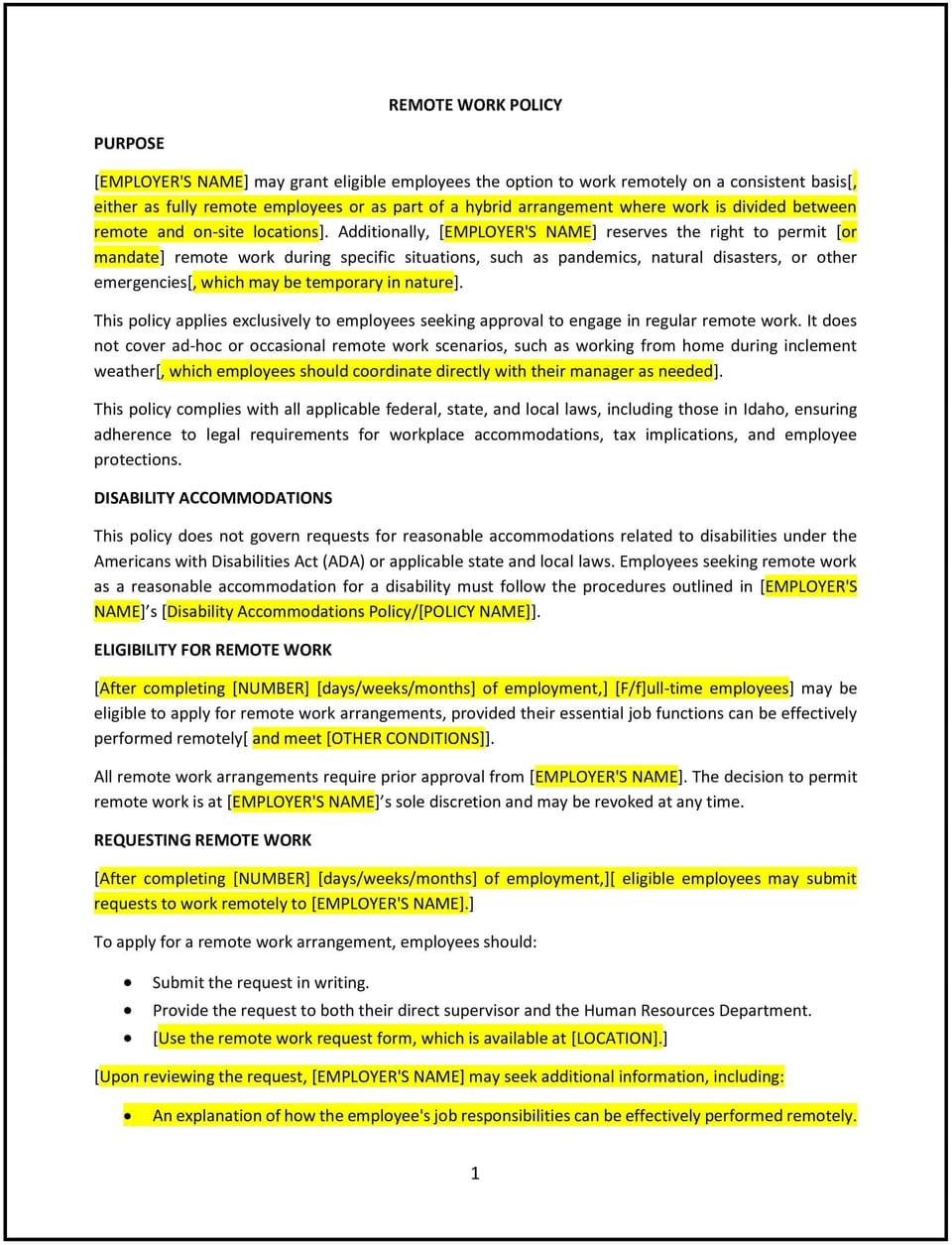Remote work policy (Idaho): Free template

Remote work policy (Idaho)
A remote work policy helps Idaho businesses establish guidelines for employees who work outside the traditional office environment. This policy outlines expectations for remote work arrangements, including eligibility, communication protocols, equipment requirements, and performance standards. It also addresses compliance with Idaho labor laws, such as wage and hour regulations, and reimbursement for work-related expenses.
By implementing this policy, businesses can create a structured and flexible work environment that supports employee productivity, work-life balance, and operational efficiency.
How to use this remote work policy (Idaho)
- Define eligibility criteria: Specify which roles or employees are eligible for remote work based on job responsibilities, performance, and business needs. This ensures fairness and consistency in granting remote work opportunities.
- Set clear expectations: Outline work hours, availability, and communication protocols to ensure remote employees remain accessible and productive during business hours. Include guidelines for responding to emails, attending virtual meetings, and collaborating with teams.
- Address equipment and expenses: Detail the equipment and tools the business will provide, such as laptops, software, or internet stipends. Include reimbursement policies for work-related expenses, as required by Idaho labor laws.
- Establish performance metrics: Define how remote employees’ performance will be evaluated, including key performance indicators (KPIs), deadlines, and reporting requirements. This ensures accountability and alignment with business goals.
- Ensure compliance with Idaho laws: Incorporate provisions for meal and rest breaks, overtime pay, and record-keeping to comply with Idaho labor regulations. This helps businesses avoid legal risks and maintain fair treatment of remote employees.
- Promote data security: Include guidelines for protecting sensitive company information, such as using secure networks, VPNs, and password-protected devices. This minimizes the risk of data breaches and ensures compliance with privacy laws.
- Provide flexibility and support: Encourage managers to maintain regular check-ins with remote employees to address challenges, provide feedback, and foster a sense of connection to the team.
Benefits of using this remote work policy (Idaho)
This policy offers several advantages for Idaho businesses:
- Enhances employee satisfaction: Remote work options improve work-life balance, leading to higher job satisfaction and retention rates.
- Increases productivity: Many employees are more productive when working remotely, as they can focus on tasks without office distractions.
- Reduces overhead costs: By allowing remote work, businesses can save on office space, utilities, and other operational expenses.
- Attracts top talent: Offering remote work options makes businesses more competitive in attracting skilled professionals who value flexibility.
- Supports compliance: The policy ensures adherence to Idaho labor laws, reducing the risk of legal disputes or penalties.
- Promotes inclusivity: Remote work opportunities can accommodate employees with disabilities, caregiving responsibilities, or other personal circumstances, fostering a more inclusive workplace.
Tips for using this remote work policy (Idaho)
- Communicate the policy clearly: Share the policy with employees through onboarding materials, training sessions, or internal communication platforms to ensure understanding and compliance.
- Train managers: Provide training for managers on how to effectively lead remote teams, including setting expectations, providing feedback, and maintaining team cohesion.
- Monitor performance: Use performance metrics to evaluate remote employees’ productivity and address any issues promptly.
- Review expenses regularly: Ensure compliance with Idaho labor laws by regularly reviewing and updating reimbursement policies for remote work expenses.
- Update the policy as needed: Periodically review the policy to reflect changes in business needs, workforce preferences, or Idaho labor regulations.
- Foster team connection: Encourage virtual team-building activities and regular check-ins to maintain a sense of community among remote employees.
Q: Why should Idaho businesses have a remote work policy?
A: A remote work policy provides clear guidelines for employees and ensures compliance with Idaho labor laws, reducing legal risks and supporting a productive work environment.
Q: What expenses must businesses reimburse for remote employees in Idaho?
A: Idaho law requires businesses to reimburse employees for necessary work-related expenses, such as internet costs, phone bills, and office supplies.
Q: How can businesses ensure remote employees take meal and rest breaks?
A: The policy should outline expectations for taking breaks and require employees to record their work hours accurately, as mandated by Idaho labor laws.
Q: Can all employees work remotely under this policy?
A: Remote work eligibility depends on job responsibilities, performance, and business needs. The policy should specify which roles are eligible for remote work.
Q: How can businesses maintain data security for remote employees?
A: The policy should include guidelines for using secure networks, VPNs, and password-protected devices to protect sensitive company information.
Q: How often should the policy be reviewed?
A: The policy should be reviewed annually or as needed to reflect changes in business operations, workforce needs, or Idaho labor laws.
Q: What happens if a remote employee’s performance declines?
A: Managers should address performance issues through regular check-ins, feedback, and performance improvement plans, as outlined in the policy.
This article contains general legal information and does not contain legal advice. Cobrief is not a law firm or a substitute for an attorney or law firm. The law is complex and changes often. For legal advice, please ask a lawyer.


